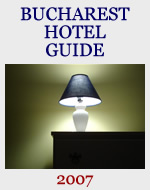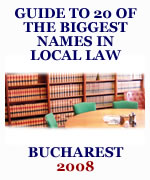Changing with the times
Turkish business has adapted to the post-1989 development of Romania, from small enterprise to big manufacture and recently real estate
|
||||||||||||||
Romania’s EU accession has boosted Romania’s attractiveness for Turkish businesspeople, who are now involved in almost every sector of the Romanian economy from manufacturing to real estate.
“As the level of investments continues to develop, the number of Turkish businessmen will increase,” says the Turkish Ambassador Ayse Sinirlioglu.
Since 1989 Turkish investment in Romania has totalled more than 500 million Euro officially. There are also large scale investments with Turkish capital, such as Azomures, Credit Europe Bank and Garanti Bank, which are registered in the Netherlands. Guven Gungor, general secretary of the Turkish Businessmen’s Association (TIAD), estimates the actual investment at two billion Euro.
For Turkish companies the most interesting sectors are real-estate, construction equipment, the automotive industry, home appliances, textiles and food. “The Turkish constructing and contracting industry is the world’s third largest after the USA and China,” says Sinirlioglu.
There are currently 26 Turkish construction companies taking advantage of the Romanian construction boom. “I am confident that their number will continue to increase,” the Ambassador adds.
But a global financial downturn has seen enthusiasm for real-estate projects begin to abate. “In the last two years the most popular investment area for Turkish businesspeople was real-estate, but now I cannot say that there is the same interest for this sector,” says Gungor. “Due to the global recession, most of them have revised their investment plan. But the Romanian economy is not very vulnerable to the global waves of the financial sector. There have been some effects, but it’s not going to be a crisis. Despite some withdrawals, the projects will continue due to demand.”
Owing to the political uncertainty due to this November’s general election and the global financial crisis, Gungor does not expect to see recovery in the real estate sector until the second quarter of 2009 at the earliest.
Turkish investors are also interested in infrastructure projects with local authorities and state agencies. Although the demand is high, Gungor says investors are not receiving any state incentives for projects. “Until now there has been no successful public private partnership (PPP), due to a lack of administrative capacity to carry out such a project,” says Gungor. “Because of this, investors are afraid to get involved.”
Turkish investors are also discouraged by the increase in the costs of energy, land and construction costs, says Turkish commercial counsellor Necati Yilmaz.
Another problem is that Turkish citizens must wait up to three months to obtain a work permit for Romania, which holds up investments and frustrates companies under tight time schedules. “This mandatory period for obtaining a visa or a working permit and the bureaucratic steps block the activity of some Turkish companies and I do not see any major change in the near future,” says Gungor. Although part of this wait is due to EU regulations, the only aspect that could witness improvement is less bureaucracy.
Turkey’s EU accession has been stalled by a wave of Euroscepticism from some member states and a consensus in Brussels that the 27 member bloc needs a period of ‘digestion’ of its latest entrants before beginning to swallow new members. Although Turkey’s entry has experienced vocal criticism from Austria and France, negotiations for Turkey’s entry began in 2005. Romania remains a supporter of Turkey’s move.
“By and large it is an uphill battle [to EU entry] since certain circles exploit the process for their narrow political motives,” says Sinirlioglu. “However we are determined to successfully conclude this process and to bring Turkey on board as nothing less than a full and equal member.”
Turkey expects the EU to “fulfil its commitments” and take the necessary steps to ensure that concrete progress is made in accession negotiations, says Sinirlioglu. “In this context it is of utmost importance that the negotiations process is not interrupted for political reasons,” she adds.
Interviews by Alexandra Pehlivan
Dogan Group: planning 600 million Euro investment
Turkish holding Dogan Group arrived in Romania two years ago to set up TV station Kanal D and now plans a massive extension into real estate in north Bucharest. “We may establish [in Romania] another TV station at the beginning of 2009 as well as a radio station in the near future,” says Haluk Kurcer, executive board member at Kanal D Romania.
“We came late to Romania and should have arrived here earlier with our media projects,” adds Kurcer. “Among all neighbouring countries we chose to invest in Romania because it is close to Turkey, provides great opportunities for foreign investors who are looking for a stable political and economic environment, has a growing economy and a regulated market.”
In Turkey, Dogan Group owns 30 TV channels, as well as newspapers and magazines.
The family-owned business has also bought a 55,000 sqm land plot on Pipera-Tunari, Ilfov county, near the Vodafone offices for 50 million Euro. The group has a 350 million Euro investment plan for this land, including a five-star hotel, a 200-bed private hospital, a large office building and probably some residential units in the next three years.
Dogan is in talks with a Turkish company focused on private healthcare to manage the hospital and is in negotiations with an international brand to manage the 300-room hotel. Dogan Group is also interested in the energy sector. “From hydro energy to gas stations, everything is possible for Romania,” says Kurcer. The Turkish group’s total investment plan for the next four to five years is worth around 600 million Euro.
Dogan Group
Holding company
Majority owns TV station Kanal D
■ Investment plans until 2011: 350 million Euro
■ Total investments so far: 30 million Euro in Kanal D and 50 million Euro in land in Pipera, Ilfov
Plus Group: most residential investors have been foreigners
Turkish real estate division of Plus Group, Plus Development will deliver this November 183 apartments in its My Dream Residence project, in Pipera near the American School, and will start constructing another residential project in the same area.
Around 65 per cent of My Dream Residence has been sold and the developer is hoping sales will reach 80 per cent at the point of delivery. “Most customers are foreigners coming from UK and Spain and 25 per cent of the flats were acquired by investors,” says Mert Berberoglu, managing partner at Plus Development. Investment funds prefer to buy smaller apartments, while end users want three- room apartments, he says.
Plus Development bought the land for the development of My Dream Residence in 2005 when they paid 100 Euro per sqm, while three years later the land price appreciated tenfold. The company owns several other land plots in Pipera, where it plans to develop a residential project of 500 apartments and a private hospital.
Plus Development
Real estate developer
■ Established in Romania: 2005
■ 2008 targeted turnover: 55 million Euro
■ Ongoing projects: My Dream Residence, 183 apartments located in Pipera
Opus: new regulations may influence homebuying
Real estate developer Opus Land Development, a subsidiary of the Turkish Buyukhanli Group, has sold all 565 living units in the first stage of its 700 million Euro Cosmopolis project in Stefanestii de Jos, Ilfov county and half the apartments in its second stage.
Cosmopolis is a suburban town under creation in the outskirts of Bucharest including 4,600 apartments, which will be delivered by 2014.
New credit restrictions, coming into force this month by Romania’s central bank (BNR), will restrict the amount of money homebuyers can borrow as a percentage of their declared income. Ahmet Buyukhanli, chairman of Buyukhanli Group says that the regulations “might affect” some customers’ purchasing decision, but he says this is still a “high demand” for apartments.
While the dwellings included in the first stage were sold at promotional prices, ranging between 900 and 1,050 Euro per sqm, the prices have increased by ten to 15 per cent for the units in the second stage. “We project increases for the future stages, as the infrastructure improves,” says Buyukhanli.
Opus Land Development
A subsidiary of the Buyukhanli Group
■ Ongoing projects: 4,600 homes in Cosmopolis
■ Total investment: 700 million Euro
Rulmenti Barlad: from ballbearings to real estate
Since its privatisation in 2000, ballbearing producer Rulmenti Barlad has seen investments totalling 38 million Euro from its major shareholder, Kombassan Turkey and is now looking to the property market.
Rulmenti Barlad owns a land plot and is in negotiations with developers to create a 7.5 million Euro residential and commercial project.
“We don’t have, for the time being, other similar plans for the future but, depending on the success of this project, we could have in view this aspect in the next years,” says Ismail Hakki Turanli, general manager of Rulmenti Barlad.
This year Rulmenti Barlad plans to invest 6.9 million Euro to modernise and acquire new equipment. “Next year the company intends to invest its entire 5.5 million Euro profit in continuing to modernising the installations,” says the general manager.
The manufacturer exports 84.8 per cent of its products. This mainly targets the United Arab Emirates, Belgium, the USA and Germany, with the majority heading for European countries.
Rulmenti Barlad
Owned by Kombassan Turkey
Ballbearing producer
■ 2008 forecast turnover: 65 million Euro
■ 2008 forecast profit: five million Euro
■ Employees: 2,900
Credit Europe Leasing: becoming more selective
Given recent developments in the global economy, Credit Europe Leasing will concentrate on its existing portfolio rather than growing aggressively. “We will be more selective in our transaction types and clients,” says Beril Tansel, vice president marketing of Credit Europe Leasing.
The slowdown of the economy is leading to an increased cost of borrowing, which is generating a rise in the cost of leasing. There is also a difficulty in finding experienced workers due to the rapid growth of the financial markets in Romania and the burden, for companies, of constantly increasing salaries. Tansel expects the Romanian leasing market to register a maximum growth of 25 per cent in 2008 compared to a 51 per cent year-on-year rise in 2007.
Credit Europe Leasing
■ 2008 forecast turnover: 100 million Euro
■ Employees: 71
■ Branches opened: five
■ Branches opened in 2008: Timisoara and Iasi
Azomures: planning multi-million co-generation unit
After spending about 70 million Euro in the last decade in restructuring, new technologies and products, fertiliser producer Azomures has announced 211 million Euro of investments by 2013 in building a co-generation unit and upgrading its urea and ammonia facilities.
The company aims to maximise its profits by increasing its energy efficiency, according to CEO Fuat Kalgay.
The chemical complex, located five kilometres from Targu Mures city centre was privatised in 1998, when the company was close to bankruptcy. After the takeover, Azomures had to pay over 18 million USD in state debts, mainly arising from unpaid gas bills. According to Kalgay, Azomures is the only Romanian fertiliser producer to settle its post-privatisation debts. “I’ve been doing business with Romania since 1974 and looking back at my time in Romania, I express my happiness and the feel-at-home taste in my mouth, although my memory holds major cases of unfair treatment by the bureaucracy,” says Azomures’s CEO. “Even now I still cannot understand why Azomures was forced to pay a penalty of millions of dollars.”
Currently, major markets for Azomures are the USA and the EU, each representing about 33 per cent of total exports. Due to this, Azomures has managed to survive during times when Romanian fertiliser consumption dropped to 25 per cent of the EU average. “However, today, following Romania’s EU accession, conditions have started improving,” says the CEO. “Especially with the EU support for Romania’s economical re-structuring.”
Azomures
Fertilizer and melamine producer
■ Controlled by Transworld Fertilizers Holding (55.97 per cent)
■ Fondul Proprietatea holds 7.68 per cent stake
■ 2007 turnover: 264.7 million Euro
■ 2007 profit: 19.47 million Euro
■ 2008 forecast turnover: 422.6 million Euro
■ 2008 forecast profit: 84.5 million Euro
Employees: 2,700
Synergy: 2009 will see construction of 900 flats
Construction firm Synergy Construct has started to deliver the first of the 908 apartments included in the Rose Garden residential complex, developed by Globe Trade Center (GTC) in Bucharest on Soseaua Colentina. “The whole project should be delivered by October 2009,” says Savas Gunata, managing partner at Synergy Construct.
Meanwhile the three million Euro holiday project Sara Sea View Residence, built by Synergy Construct in Olimp, Constanta county, will be ready by the end of this year. “The developer has sold around 60 per cent of the apartments - a good figure for the seaside,” says Gunata.
But Synergy has decided not to bid for any more residential projects for the moment, due to the tough financial situation and because the slated projects carry too many complications.
By Christmas the company must complete work on its first shopping centre, the 45,000 sqm Outlet Fashion House Center on the Bucharest-Pitesti motorway. “We want to focus more on building malls,” says Gunata. The company will bid for the construction of Galleria shopping centre in Bucharest developed by GTC.
Last year Synergy announced its first two projects as developer. The company plans to start next spring on a 15-storey 100-unit luxury apartment project in Straulesti, north Bucharest for delivery in 2011. Synergy Construct owns another 5,000 sqm in the same area, where it can build 250 apartments. “Straulesti will become similar to the Herastrau area, but less populated,” Gunata argues. In Iasi city centre Synergy will also develop an office building due for 2010.
Synergy Construct
Contractor in construction works
■ 2007 turnover: 48.7 million Euro
■ 2008 turnover for the first six months: 25.6 million Euro
■ Employees: 1,200 of which 150 are Turkish
G’Market: two more stores planned for 2009
Supermarket chain G’Market owns seven stores in Romania, but will not open any new outlets this year. Instead the firm will budget four million Euro for investments and prepare for two new units in 2009.
“The locations of the stores are not finalised, but the company is preparing some feasibility studies taking into account the demographic figures of prospective cities,” says Sertan Doven, general manager of G’Market.
Last year the retailer opened a 1,150 sqm supermarket in Focsani and a 4,500 sqm store in Bacau. The company also plans to open in the shopping centre developed by the Anchor Group in Chisinau
G’Market
■ 2007 turnover: 55 million Euro
■ 2008 forecast turnover: 62.26 million Euro
■ 2007 profit: 56,232 Euro
■ Employees: 700
■ Units: Bucuresti Mall, Plaza Romania, Colentina, Iulius Mall and Hala Centrala Iasi, Focsani, Bacau
Kanal D: aiming to strengthen news coverage
In 18 months since it started broadcasting, TV channel Kanal D states it has breached the top five channels in Romania in terms of audience share.
“We aim to be in the top three best TV stations by the end of the third year of broadcasting,” says Hatice Soysev Kolat, general manager of Kanal D.
Romania has a multitude of channels, many of which focus on showing music videos or chat shows. Soysev Kolat argues that instead of more TV channels, Romania should build up production houses and encourage more professionalism in television. Dogan itself intends to invest in a production house in the future. Romanians also have a large appetite for TV news and this autumn Kanal D has begun investing to strengthen its news coverage.
The strong points that initially attracted viewers to Kanal D were reality wedding show Nora pentru mama [‘A daughter-in-law for mother’] and football matches from Romania’s Premier League. The channel also managed to woo TV star and comedian Mugur Mihaescu from market leader Pro TV.
Kanal D
TV station
Owned by Dogan Group and Switzerland’s Ringier (25 per cent of the total shares)
■ Total investments so far: 30 million Euro
■ Employees: over 200
by Alexandra Pehlivan, Ana-Maria Nitoi
and Corina Ilie

















